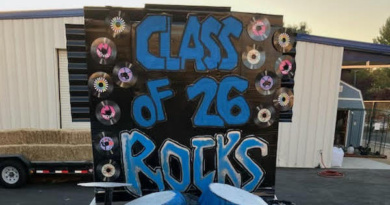Common Core math elicits mixed reviews

By Dahlia Kraus,
BlueDevilHUB.com Staff–
Changes are now evident in math classrooms across the U.S. as Common Core math curriculum has been in place for more years. The Davis High community is one of many affected by the new standards.
DHS head counselor Catherine Pereira said placing students who moved from states without Common Core in the appropriate math classes and having them adjust has been challenging.
For example, sophomore Elisabeth Bond had a very different math experience at Auburn Junior High School in Alabama. She said her teachers presented power points covering key concepts and then assigned practice problems. Bond liked the repetition of doing many math problems and is not accustomed to Common Core.
As a parent, Pereira has hands on experience helping her daughter with Common Core math problems. “I have to figure out what it’s asking,” she said.
For Pereira, Common Core’s different approach to math makes understanding problems more difficult at times. Essentially, math is being taught differently.
State education standards have existed since the 1990s, and by the 2000s states had established their own standards specifying proficiency from elementary school through high school, according to the Common Core State Standards Initiative (CCSSI).
But states ended up with varying standards, so Common Core standards were developed in 2009, based on input from governors, state education chiefs, education researchers, teachers and the public.
In 2011, states began implementing Common Core standards and today 41 states use it, according to the CCSSI.
Common Core has students explain how math problems work instead of repetition and drilling which was emphasized in old curriculum, DHS math teacher Michael Murphy said.
Like many teachers, he acknowledges pros and cons to Common Core.
Decreased practice can cause students to be less comfortable when they move to complex problems, Murphy said.
On the other hand, a study published on the website Learning and Memory found that learning from repetition can interfere with the ability to learn new information. DHS math teacher Erwin Macalalad agrees, saying that old curriculum had students “regurgitate [concepts] over and over again without really thinking.”
Philip Raymond, who has taught math for 21 years, thinks “a blend [of curriculums] is best.”
Common Core math standards have also introduced group work.
A project from the University of Minnesota analyzed 168 studies comparing cooperative learning to competitive and individualistic learning. Across the studies they found that students perform better academically with cooperative learning.
Sophomore Grace Heringer said she likes group tests because they allow her to review before a unit test and help her understand concepts.
But DHS math teachers have also observed that students have the opportunity to be more off task and copy work when in groups.
Math teacher Michael Wright summed it up by saying Common Core is “all about teamwork… [but] you can get lost in a team.”




